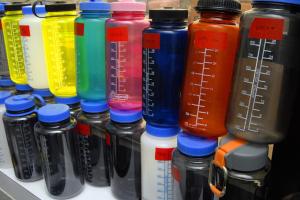No harmful effects were found on the development and fertility of mice that were exposed to low doses of bisphenol A, this is in contrast to a previous study from the beginning of the year that caused a storm around the world and the cessation of the use of plastic bottles containing bisphenol A, especially for feeding babies

In a new multigenerational study regarding the toxicity against fertility of mice, following a diet that includes bisphenol A (BPA), and which was conducted by researchers from the chemical company RTI International, no harmful effect of the substance was found on the generation of the parents or the generation of the offspring at dose levels corresponding to the amount Exposure to humans.
These findings imply that oral exposure to the substance is not dangerous for children or adults in the low doses to which they are exposed. The study, published in the August issue of the journal Toxicological Sciences, assessed the health risks to humans from oral exposure through experiments that examined the toxicity of the substance bisphenol A on fertility in two generations of mice. The study is the largest and most comprehensive to date to assess the possible health risks of oral exposure to the above-mentioned substance. The findings of the study were reviewed and accepted as part of the European Union's risk assessment.
"Several basic studies on a small scale, which reported the harmful effects of the substance Bisphenol A, caused extensive news coverage and public concern in recent months, and caused an incomplete picture of the issue to be received," says researcher Rochelle W. Tyl, Ph.D. at the research center who designed and carried out the new study. "For the sake of a reliable assessment of health risks, it is mandatory to use reliable experiments based on strict laboratory work principles."
The researchers who carried out the study provided the mice with a diet that contained the substance Bisphenol A in a wide range of doses and evaluated the systemic, developmental and fertility effects in the parents and their offspring in two generations.
The researchers did not find any evidence of harmful effects on the developmental and reproductive system when exposed to the substance in doses suitable for human exposure, in a range that extends from one microgram (millionth of a gram) or less per day to 50,000 times higher than the appropriate human exposure levels.
The findings from this study are consistent with the results of a similar previous study by the institute from 2002 that examined the dangerous doses for rats and another similar study conducted in Japan. In all three of these studies, no harmful health effects were found as a result of low doses of bisphenol A, which correspond to the amount of exposure of this substance to infants and children.
Two factors support the claim that the substance does not lead to harmful effects in humans - first, the amount of oral exposure of the substance in the human population is extremely low, both among infants and among adults. Second - consuming the substance orally causes it to be quickly and efficiently discharged in the intestine and liver, even before it reaches the bloodstream. That is, at these low human exposure doses, bisphenol A is eliminated from the body quickly and completely through the urine, both in newborns and in adults. As a result, there is almost no internal systemic exposure at such low doses.
"We conducted these studies in response to ongoing social, scientific and international concerns regarding the safety of the substance," says the lead researcher. "Researchers have not been able to confirm or repeat the results of the alarming reports regarding the harmful effects of the substance on humans obtained in small and basic studies. In more reliable tests, such as experiments conducted based on government research guidelines while consuming the substance orally, similar to the study we conducted now, the findings are much less worrying and more grounded." Both RTI studies were funded by the American Plastics Council and the American Chemistry Council, located in Arlington, Vermont.
The article in the journal Toxicological Sciences
For the news warning about the use of this material, Hidan, 5/8/2008

3 תגובות
It is truly amazing that only the studies funded by the plastics companies (the two studies of the RTI institute were funded by the American Plastics Council and the American Chemistry Council) reach such conclusions about bisphenol being a harmless substance, while independent studies reach conclusions that clearly link between exposure to the substance
It is impossible to compare the effect of a hormone-like substance on a mouse and its effect on a person. The human and mouse hormonal systems are very different.